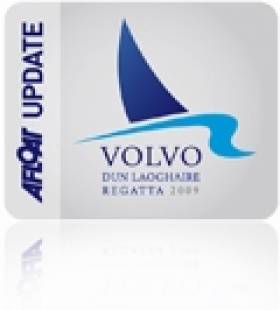Displaying items by tag: Henry Leonard
First entries in for Volvo Dun Laoghaire Regatta
July's Volvo Dun Laoghaire regatta has taken in 22 entries six months ahead of the first race. It's an encouraging figure that's on a par with the 2009 VDLR, the biggest regatta in Irish sailing that year.
The positive early response is an indication, says organiser Adam Winkelmann, that the 2011 fleet, should be a bumper one too when it sets sail on July 7th for the four day event.
The emphasis is again on providing quality racing over different courses each day but organisers are also aiming to live up up to the regatta's pre-event billing as a 'Mega Party'.
The event has opened a new website, a new Facebook page (with afloat.ie, so if you're a Facebook user please show your support and 'like it'). The regatta site is also featuring the youtube clip below of events on the bay two years ago.
So far entries received are spread across nine separate classes but it's a visiting Wayfarer fleet with eight boats named already that is setting the pace. The organisers are expecting up to 50 of the two man classic design for the class National Championships that's being staged as part of the regatta.
The notice of race (NOR) was published online in October and highlighted a reduced entry fee for 'earlybird entries'. Click HERE. or scroll down to download it as a PDF. If you participated in 2009 and entered online, this year you only need to enter your email address.
Three boats are entered in the non spinnaker class and another three in the Squib keelboat. Two entries have been received in both IRC 2 and 3.
It's still too early for a table of bands to be decided but the organisers intend to give some indication of handicap break-ups as the entries build. The IRC bands will be in line with those laid down by the Irish Cruiser Racing Association.
Despite the fact the regatta's strength since 2007 is that it draws on the capital's own fleet of 400 boats it is in fact visitors from elsewhere on the east coast that are first in. East Down Yacht Club, for example, has four entries.
But locals are signing up too. Single entries have been received in the Mermaid, Beneteau 31.7, Dragon and IRC Zero classes.
Course areas are likely to stay the same according to principal Race officer con Muphy of the National YC. Th race team is Alan Crosbie - KYC, Peter Crowley - RCYC,
David Lovegrove - HYC, Harry Gallagher - HYC, Henry Leonard - RIYC, Jack Roy - RIYC and Con Murphy - NYC. Mike Butterfield will head up the jury.
The organisers are on the look out for volunteers to assist in the run up to and during the country's biggest sailing event. In 2009 over 300 helped to make it the biggest participant sport event in the country after the city marathon, with over 3,500 sailors afloat. More details from Ciara in the event office HERE.





























































